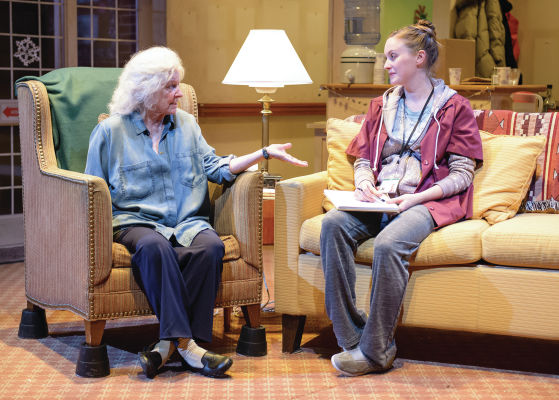
Existential voids come in all shapes and sizes. Samuel D. Hunter's begins in an unnamed assisted-living facility located (unsurprisingly) in the hinterlands of a likewise remote Idaho city. Its corporate owners are closing it down at the end of the week, leaving certified nursing assistants Faye and Ginny, staff supervisor Jeremy, and part-time cook Ken to care for the three remaining residents—surly Tom and cheerful Etta, who remain unperturbed, and Etta's 90-year-old husband Gerald, who chafes under advanced dementia. The building's malfunctioning automatic doors open and shut of their own accord, and a blizzard has closed the roads. Oh, and this morning, Gerald is reported missing, perhaps wandering in the storm.
Well, do you go outside to look for him? If so, how far, and for how long? If he's found dead, where do you store the body until the morticians can navigate the drifting snow? If the circumstances of his final hours rouse suspicion, how deeply do you investigate?
The immediate problems associated with physical isolation gradually give way to uncertainties already lurking beneath the placid surface, chief among which is the question of where the oldsters will find shelter and where the employees will find work following their eviction—especially those who dedicated themselves to the care of family members out of expedience, but now must confront the prospect of living alone and free to pursue their own goals.
The chuckles of a few audience members on opening night of the Victory Gardens midwest premiere of Rest attested to the current status of elderly citizens as a ready source of amusement. This misguided response quickly diminished, however, as Hunter's bunker drama delved the introspections of its imprisoned personnel to reveal who volunteered as a womb-for-hire and is having second thoughts about it, who is acutely aware of his own job incompetence, and who fled his abusive family for the safety of religion. Eventually, we also learn of Gerald's fate. Director Joanie Schultz directs her three-generation cast with a tight rein, ensuring that only the most tin-eared playgoer (the same ones labeling Caitlin Parrish's Downpour a "thriller") could impose sitcom risibility on this intimate portrait of middle Americans in crisis, stranded with no recourse but to offer one another aid, comfort and counsel. Bereft of the reassurances of civilization—cars, telephones, electricity—even a potentially twee huddle on the sofa under a communal blanket represents an extension of human compassion capable of generating epiphany and empathy to bring a new dawn.
